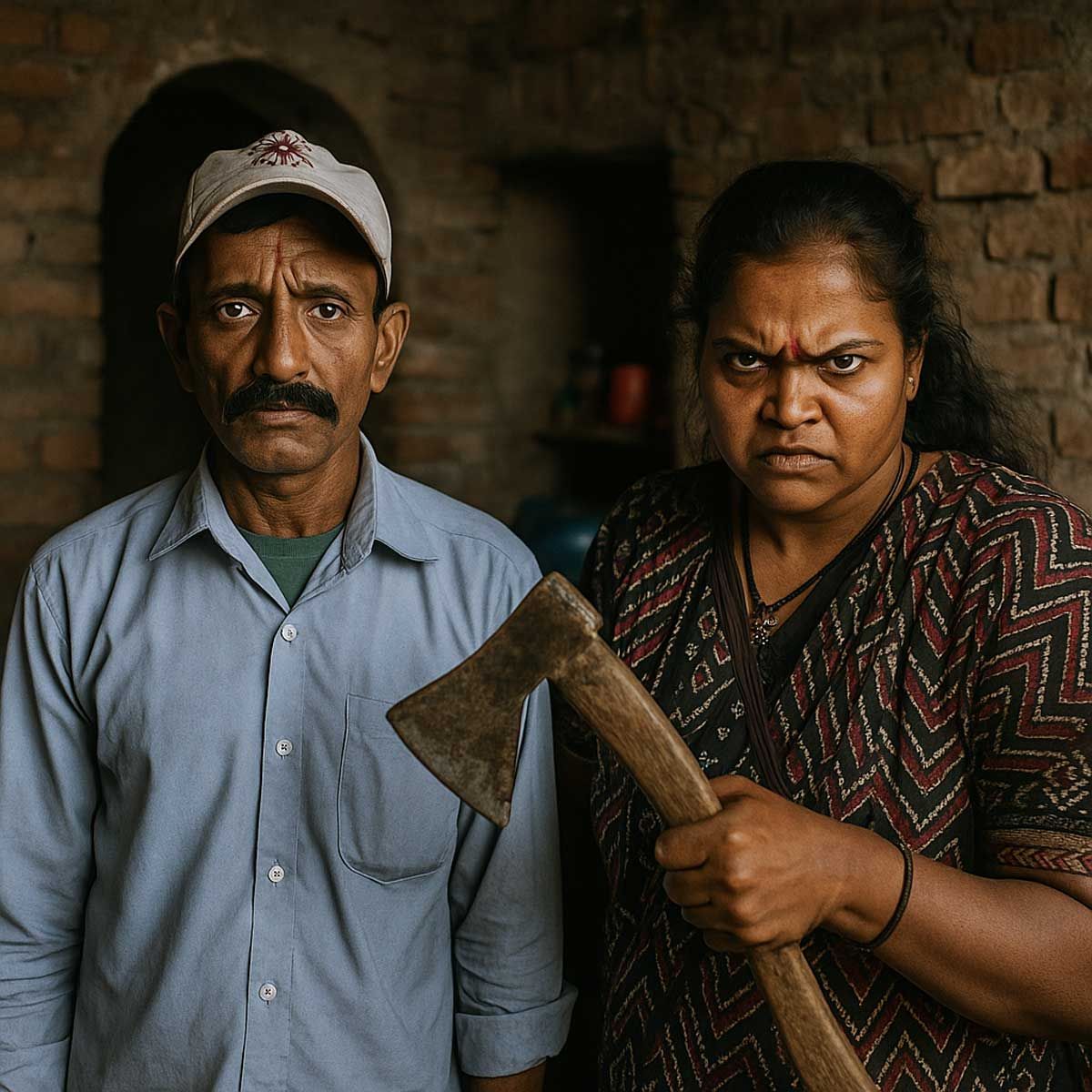More Coverage
Twitter Coverage
Satyaagrah
Written on
Satyaagrah
Written on
Satyaagrah
Written on
Satyaagrah
Written on
Satyaagrah
Written on
JOIN SATYAAGRAH SOCIAL MEDIA
"Nothing revives the past so completely as a smell that was once associated with it": Kannauj, a small town located in Uttar Pradesh of India has a rich history of producing high-quality fragrances using natural ingredients that predates written language

Kannauj, a small town located in the northern state of Uttar Pradesh in India, has a rich history of producing high-quality fragrances using natural ingredients. The town has been involved in the perfume industry for centuries and has become known as the perfume capital of India, attracting visitors from around the world who are interested in fragrances.
‘Traditional perfumery in India predates the written language’...reads the text in a YouTube documentary made by two UC Berkley students Ciella Sfirri and Christopher Ehermann. The video, made on the decline of Kannauj's perfumes and traditional perfumery, is truthful and poignant. Yet this wasn’t the first time I heard of poor fragrance practices, in what is considered to be the perfume capital of India. For almost a decade now beauty insiders have been in the know about the contamination of plant essences that come from this city. This decline seems even more unfortunate if you trace the history of perfume making in our country. Perfumery was a skill popular all across northern India, which has now shrunk to just the city of Kannauj where it deteriorates rapidly.
One of the key reasons for Kannauj's success in the perfume industry is its abundant supply of natural ingredients, such as sandalwood, rose, jasmine, and musk. These ingredients are carefully selected and harvested by farmers in the surrounding areas, who have inherited their knowledge and techniques from previous generations.
Kannauj is known for its traditional methods of producing perfumes, which involve the distillation and extraction of natural oils from the selected ingredients. This process requires skilled workers who have years of experience and training in the art of natural perfumery.
|
However, despite its rich history and reputation, the perfume industry in Kannauj is facing a significant challenge: the dying art of natural perfumery. With the rise of synthetic fragrances and the declining interest in traditional perfumes, the demand for natural perfumes has decreased significantly over the years.
“Not many know that Kannauj wasn’t just one city but the entire North India, which was called the kingdom of Kannauj under King Harshvardhan around 600 CE,” says Dr Jyoti Marwah, founder, of Mussorie Fragrance and Flowers Institute. Even today we can see remnants of old-school fragrance-making still in fragrance factories of Jaunpur, Benaras, and Ghazipur that were earlier a part of this kingdom. “In fact, the first discovery of fragrance-making material – for distillation and storage - was in the Indus Valley Civilisation.” Marwah explains that initially aromatic waters were created to be part of the offering to god, subsequently worn as perfume. “Kannauj has been mentioned time and again in history – Huan Tsang has spoken about how perfumery was used all across North India and Ptolemy has specifically mentioned about aromatics in Kannauj.” So great was the city’s affiliation with attar-making that King Harvardhan under his rule called it Kusumpura - the city of flowers.
There is no doubt that fragrance has always been a big part of Indian culture, whether it's wearing attars, lighting incense sticks, perfuming our food with spices and essences, the tradition of paan, or adorning our hair with fragrant flowers. Our country is also blessed with plants such as sandalwood, jasmine, vetiver, rose, and spikenard that often form the base of perfumery. But we have failed to preserve both natural resources and skill, whether it's via a lack of policies or poor customer interest. Take the case of sandalwood, which is almost impossible to source. “Earlier there were a few distillers of sandalwood, when it used to come from Veerappan (Indian bandit also known as sandalwood Veerapan for his control of this resource), but after he was killed, there are barely any sources,” says Marwah.
The other natural resource that is rapidly dwindling is spikenard or jatamansi, a precious ingredient used in perfumery and also as a sedative in Ayurveda. We have lost about 60-70% of its reserves in the Upper Himalayas only because it hasn’t been preserved properly. As for Kannauj's perfumes, the last decade or so has seen a sharp fall in the quality of pure attars and essences, as the increased demand for synthetics has elbowed out traditional players.
|
This has had a major impact on the livelihoods of the people involved in the perfume industry in Kannauj, particularly the farmers and workers who rely on it for their income. Many farmers have switched to cultivating other crops or have abandoned their farms altogether, while the workers have been forced to find alternative employment.
Saad Siddiqui, who has a manufacturing business in Kannauj along with outlets in Mumbai has seen first the falling demand for pure essences firsthand. “We derive perfumes from flowers and essential oils – zero synthetics - but in the last 10 years the demand has increased for cheaper alternatives.” Naturally, this has given rise to contamination. “Take the case of nagarmotha oil, which we specialise in.” He explains that manufacturers mix 75% pure oil with 25% synthetics, which, for some reason, doesn’t show up in lab tests. “The synthetic form is 100-200 a kg as compared to 18,000 a kilo, so when 25% of essence is replaced with cheaper synthetic that causes a huge fall in price that I simply cannot compete with.”
Varun Tandon, whose family has been in the business of traditional perfume making for almost two centuries, launched (with his sister Krati Tandon) Boond, a perfumery that hopes to preserve and popularize the traditional craft of attar making. “Pre liberalization people still used a lot of pure attars because the competition was lesser. But today, not only does the attar maker have to compete with high-end fragrances but also a Rs 200 deodorant.” Additionally, he says that business owners only focused on the B2B aspect and didn’t upgrade to sell directly to the consumer. “It’s unfortunate that a lot of these people have learnt this skill from their forefathers, but they don’t want to teach it to their children.” In many families of traditional perfume makers, this is the last generation well-versed in this craft.
Though Kannauj is popular for all types of fragrant essences, they specialize in what is known as mitti attar, or the fragrance of wet earth after the rain. Bipin Mishra and his family, featured in the video, are some of the few artisanal houses that still use the traditional deg bhapka technique to extract fragrance. “My grandfather had an attar shop and in 1981 we started extracting fragrances with this distillation process.” To make mitti attar they buy ‘clay rotis’ from the local potter and use the same process of distillation. They light a fire under the degh (cauldron) and the steam from this cauldron lifts the fragrance/oil and takes it to the condenser to cool down. “The condenser has a paraffin base, which catches the fragrance of the mud,” says Mishra.
To address this issue, the government of India has taken several initiatives to promote and revive the dying art of natural perfumery in Kannauj. This includes the establishment of the Fragrance and Flavour Development Centre, which provides training and support to farmers and workers in the perfume industry, and the promotion of natural perfumes through various marketing initiatives.
|
Despite the challenges it faces, Kannauj remains committed to preserving the art of natural perfumery and maintaining its reputation as the perfume capital of India. Through its innovative techniques, high-quality natural ingredients, and skilled workforce, Kannauj continues to produce some of the world's finest fragrances and attract visitors who appreciate the artistry and beauty of natural perfumery.
There were bigger factories in Kannauj but Sfirri and Ehermann chose Mishra because it was more intimate. The fact that it was just a room below a computer training center is symbolic of how Kannauj is torn between two extremes – tradition and modernization, craft and technology. “Some might say that the industry is dying but we were surprised by the optimism of people we met, who didn’t think this industry was going away,” says Sfirri. Indeed, the industry isn’t going away but changing form. Today, gutka/pan masala flavoring forms the core of their business.
Fragrances are used in both cosmetics and food, therefore they are a part of our consumption on a daily basis. “The biggest advantage with synthetics is that they can be standardised easily, but they are made with ingredients such as phthalates that are known to be carcinogenic,” explains Marwah. For her, the solution lies in creating pressure groups to coerce policy change, “Just like pressure groups were created to ban single use plastics.” And though the road ahead requires new policies, we can begin as consumers to invest in natural fragrance extracts over an expensive designer fragrance, which sometimes costs as less as five cents to create. Because for us, this isn’t just a deterioration of quality or loss of livelihood but also a loss of craftsmanship and legacy. Can we preserve it by being customers? I believe that is a good place to begin.
References:
 Support Us
Support Us
Satyagraha was born from the heart of our land, with an undying aim to unveil the true essence of Bharat. It seeks to illuminate the hidden tales of our valiant freedom fighters and the rich chronicles that haven't yet sung their complete melody in the mainstream.
While platforms like NDTV and 'The Wire' effortlessly garner funds under the banner of safeguarding democracy, we at Satyagraha walk a different path. Our strength and resonance come from you. In this journey to weave a stronger Bharat, every little contribution amplifies our voice. Let's come together, contribute as you can, and champion the true spirit of our nation.
 |  |  |
| ICICI Bank of Satyaagrah | Razorpay Bank of Satyaagrah | PayPal Bank of Satyaagrah - For International Payments |
If all above doesn't work, then try the LINK below:
Please share the article on other platforms
DISCLAIMER: The author is solely responsible for the views expressed in this article. The author carries the responsibility for citing and/or licensing of images utilized within the text. The website also frequently uses non-commercial images for representational purposes only in line with the article. We are not responsible for the authenticity of such images. If some images have a copyright issue, we request the person/entity to contact us at This email address is being protected from spambots. You need JavaScript enabled to view it. and we will take the necessary actions to resolve the issue.
Related Articles
- Civil aviation of UP Govt signed a lease agreement with the Airports Authority of India For Construction Of Maryada Purushottam Shri Ram International Airport At Ayodhya: CM Yogi compared the airport to ‘Pushpak Viman'
- “Only those who risk going too far can possibly find out how far one can go”: 7 Adani airports saw an increase of 92% in domestic, 133% in international travelers, handled record 14.25 million passengers last year & stocks gained ₹2.2 lakh crore in 6 days
- "To save is to preserve your future": Bal Gopal Bank isn't merely a bank; it's a revolution in financial literacy for youth, Championing independence from a tender age, it nurtures dreams, and empowers the next generation for a prosperous tomorrow
- "Please switch on your cameras; Record this": FM Sitharaman refutes CPM’s claims of fund withholding, advocated for transparency & accountability in Kerala’s agricultural practises, ask investors to not be jittery as PM Modi coming back with good majority
- 'The Monk Who Transformed Uttar Pradesh and The Monk Who Became Chief Minister': Noted Author, Shantanu Gupta, who wrote bestsellers on Yogi Adityanath reached the USA for a multi-city book tour amid UP elections
- “A leader is one who knows the way, goes the way, and shows the way”: Revolution underway in India's diamond industry as Nirmala Sitharaman’s focuses on lab-grown diamonds and set the proverbial cat among pigeons in the global diamond markets
- National anthem mandatory for students and teachers before commencing classes every day in all madrasas in Uttar Pradesh: earlier only Hamd (praises to Allah) and Salam (salutations to Muhammad) were recited
- "In every empire's fall, a lesson is whispered": The enigmatic tale of Subrata Roy and the Sahara Empire, from ambitious business ventures to the infamous Rs 24,000 crore scam and the decisive steps towards redressal and justice for millions of investors
- NITI Aayog in talks with Indian Railways for putting up EV charging infrastructure powered by renewable energy resources across the country: India aims to become net-zero carbon emitter by 2030
- Bollywood icon Amitabh Bachchan invests Rs 14.5 crore in Ayodhya's Sarayu enclave, shares with Hindustan Times his excitement for 'a heartfelt journey into Ayodhya’s soul', a city dear to his heart, amid the upcoming Ram Mandir Pran Pratishtha event
- In Gulavathi, boiling oil attack on minor Hindu boy Vikas Saini by Abunasar, Avaj, and Shaukeen leads to chaos; Protests erupt, market closes, police under scrutiny; community demands justice and arrests as the incident stirs local & national attention
- "अंदाज़-ए-मोहब्बत": Priyanka, a Hindu girl from Sultanpur, was brutally strangled to death by Salman, Shahenshah, Sarwar, and Javed after she demanded marriage, all four arrested in a dramatic police encounter with illegal weapons in their possession
- "जीर्णोद्धार": Kanpur Mayor vows to restore 125 ruined temples, including Ram Janki, once used for biryani cooking, and Shiva temples filled with garbage, reclaiming encroached heritage in areas once Hindu-dominated, now largely Muslim-populated
- 'Lingerie or mangalsutra ad?': Intimate Portrayal In Sabyasachi's Mangalsutra Ad Triggers Social Media Debate
- Demolition drive against infamous gangster Mohammad Asif alias Pappu Smart carried by Yogi Govt, razed all his illegal properties to the ground: several cases including murder, loot, and extortion were registered against him




























